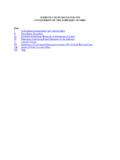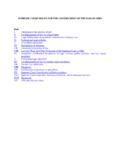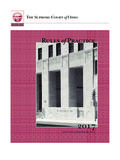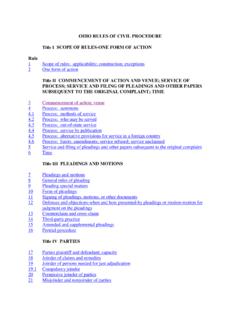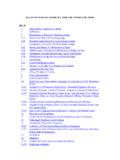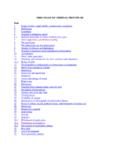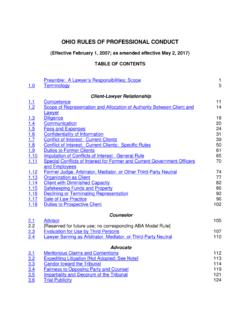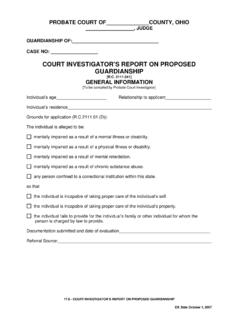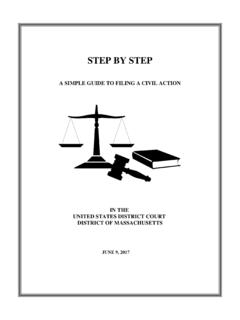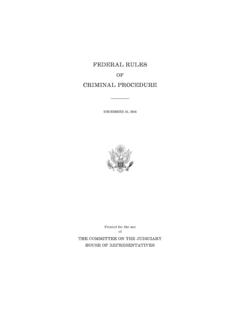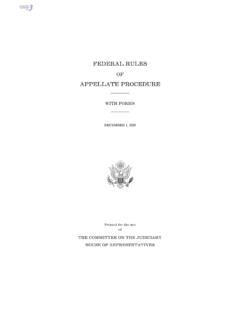Transcription of Ohio Code of Judicial Conduct - Supreme Court of Ohio
1 ohio code OF Judicial Conduct (Effective March 1, 2009; as amended October 15, 2020) TABLE OF CONTENTS Page No. Preamble & Scope 1 Application 3 Terminology 7 Canon 1 A judge shall uphold and promote the independence, integrity, and impartiality of the judiciary , and shall avoid impropriety and the appearance of impropriety. 10 Rule Compliance with the Law 11 Rule Promoting Confidence in the judiciary 12 Rule Avoiding Abuse of the Prestige of Judicial Office 13 Canon 2 A judge shall perform the duties of Judicial office impartially, competently, and diligently.
2 15 Rule Giving Precedence to the Duties of Judicial Office 16 Rule Impartiality and Fairness 17 Rule Bias, Prejudice, and Harassment 18 Rule External Influences on Judicial Conduct 20 Rule Competence, Diligence, and Cooperation 21 Rule Ensuring the Right to be Heard 23 Rule Responsibility to Decide 25 Rule Decorum, Demeanor, and Communication with Jurors 26 Rule Ex Parte Contacts and Communications with Others 27 Rule Judicial Statements on Pending and Impending Cases 30 Rule Disqualification 32 Rule Supervisory Duties 35 Rule Administrative Appointments 36 Rule Disability and Impairment 37 Rule Responding to Judicial and Lawyer Misconduct 38 Rule Cooperation with Disciplinary Authorities 39 Canon 3 A judge shall Conduct the judge s personal and extrajudicial activities so as to minimize the risk of conflict with the
3 Obligations of Judicial office. 40 Rule Extrajudicial Activities in General 41 Rule Appearances before Governmental Bodies and Consultation with Government Officials 43 Rule Testifying as a Character Witness 44 Rule Appointments to Governmental Positions 45 Rule Use of Nonpublic Information 46 Rule Affiliation with Discriminatory Organizations 47 Rule Participation in Educational, Religious, Charitable, Fraternal, or Civic Organizations and Activities 49 Rule Appointments to Fiduciary Positions 52 Rule Service as an Arbitrator or Mediator 53 Rule Practice of Law 54 Rule Financial, Business, or Remunerative Activities 55 Rule Compensation for Extrajudicial Activities 57 Rule Acceptance and Reporting of Gifts, Loans, Bequests, Benefits.
4 Or Other Things of Value 59 Rule Reimbursement of Expenses and Waivers of Fees or Charges 63 Rule Reporting Requirements 66 Canon 4 A judge or Judicial candidate shall not engage in political or campaign activity that is inconsistent with the independence, integrity, or impartiality of the judiciary . 67 Rule Political and Campaign Activities of Judges and Judicial Candidates 68 Rule Political and Campaign Activities of Judicial Candidates 73 Rule Campaign Standards and Communications 76 Rule Campaign Solicitations and Contributions 79 Rule Activities of a Judge Who Becomes a Candidate for Nonjudicial Office 86 Rule Definitions 87 FORM OF CITATION, EFFECTIVE DATE, APPLICATION 90 Note.
5 Except for Latin terms, words and phrases that appear in italicized type in each rule denote terms that are defined in Terminology or Rule Appendix A: Correlation Table 2009 ohio code to Former ohio code Appendix B: Correlation Table Former ohio code to 2009 ohio code 1 Preamble [1] An independent, fair, and impartial judiciary is indispensable to our system of justice. The United States legal system is based upon the principle that an independent, impartial, and competent judiciary , composed of men and women of integrity, will interpret and apply the law that governs our society.
6 Thus, the judiciary plays a central role in preserving the principles of justice and the rule of law. Inherent in all the rules contained in this code are the precepts that judges, individually and collectively, must respect and honor the Judicial office as a public trust and strive to maintain and enhance confidence in the legal system. [2] Judges should maintain the dignity of Judicial office at all times and avoid both impropriety and the appearance of impropriety in their professional and personal lives.
7 They should aspire at all times to Conduct that ensures the greatest possible public confidence in their independence, impartiality, integrity, and competence. [3] The ohio code of Judicial Conduct establishes standards for the ethical Conduct of judges and Judicial candidates. The code is not intended as an exhaustive guide for the Conduct of judges and Judicial candidates, who are governed in their Judicial and personal Conduct by general ethical standards as well as by the code . The code is intended, however, to provide guidance and assist judges in maintaining the highest standards of Judicial and personal Conduct and to provide a basis for regulating their Conduct through disciplinary agencies.
8 Scope [1] The ohio code of Judicial Conduct consists of four canons, numbered rules under each canon, and comments that generally follow and explain each rule. Scope and Terminology sections provide additional guidance in interpreting and applying the code . The Application section establishes when the various rules apply to a judge or Judicial candidate. [2] The canons state overarching principles of Judicial ethics that all judges must observe. Although a judge may be disciplined only for violating a rule, the canons provide important guidance in interpreting the rules.
9 Where a rule contains a permissive term, such as may or should, the Conduct being addressed is committed to the personal and professional discretion of the judge or candidate in question, and no disciplinary action should be taken for action or inaction within the bounds of such discretion. [3] The comments that accompany the rules serve two functions. First, they provide guidance regarding the purpose, meaning, and proper application of the rules. They contain explanatory material and, in some instances, provide examples of permitted or prohibited Conduct .
10 Comments neither add to nor subtract from the binding obligations set forth in the rules. Therefore, when a comment contains the term must, it does not 2 mean that the comment itself is binding or enforceable; it signifies that the rule in question, properly understood, is obligatory as to the Conduct at issue. [4] Second, the comments identify aspirational goals for judges. To implement fully the principles of this code as articulated in the canons, judges should strive to exceed the standards of Conduct established by the rules, holding themselves to the highest ethical standards and seeking to achieve those aspirational goals, thereby enhancing the dignity of the Judicial office.
